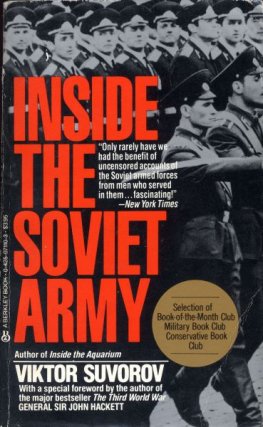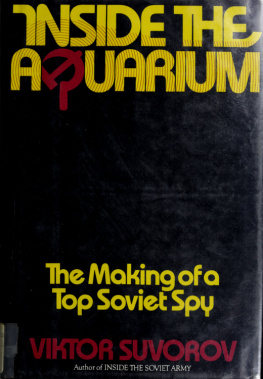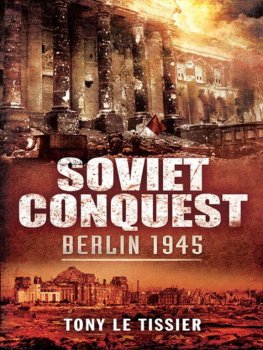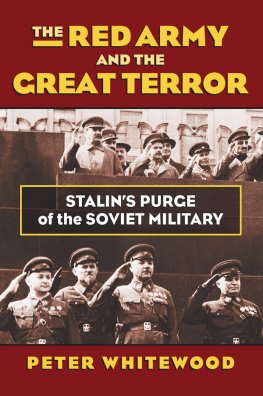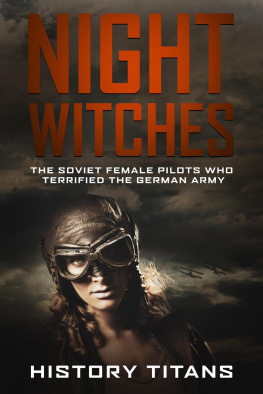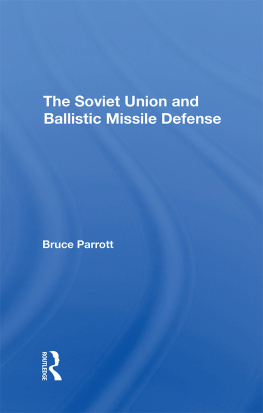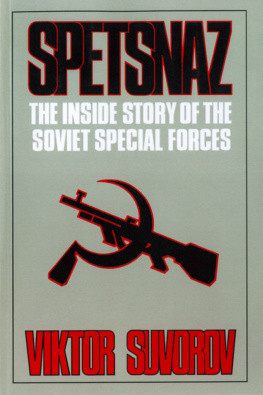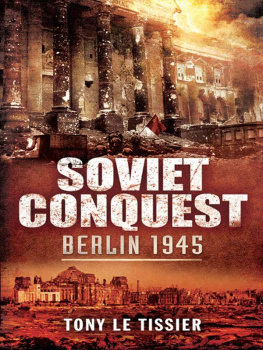Viktor Suvorov
INSIDE THE SOVIET ARMY
The book, Inside the Soviet Army, is written under the name of Viktor Suvorov. As a defector, under sentence of death in the USSR, the author does not use his own name and has chosen instead that of one of the most famous of Russian generals. This is a book that should command wide attention, not only in the armed forces of the free world, but among the general public as well. It is an account of the structure, composition, operational method, and general outlook of the Soviet military in the context of the Communist regime in the USSR and the party's total dominion, not only over the Soviet Union, but over the client states of the Warsaw Pact as well.
The book starts with a survey of the higher military leadership and an analysis of the types of armed services, and of the organization of Soviet Army formation. An examination of the Red Army's mobilization system that follows is of particular interest. The chapters that follow on strategy and tactics and on equipment are also of high interest. The first, on operational method, emphasizes the supreme importance attached in Soviet military thinking to the offensive and the swift exploitation of success. Defensive action is hardly studied at all except as an aspect of attack. The second, on equipment, examines Soviet insistence on simplicity in design and shows how equipment of high technical complexity (the T-72 tank, for instance) is also developed in another form, radically simplified in what the author calls the monkey model, for swift wartime production. The last two chapters on The Soldiers' Lot and The Officer's Role will be found by many to be the most valuable and revealing of the whole book. We have here not so much a description of what the Red Army looks like from the outside, but what it feels like inside.
This book is based on the author's fifteen years of regular service in the Soviet Army, in troop command and on the staff, which included command of a motor rifle company in the invasion of Czechoslovakia in 1968. About this he has written another book, The Liberators, which is a spirited account of life in the Red Army, highly informative in a painless sort of way and often very funny. There is rather less to laugh at in this book than in that one: Viktor Suvorov writes here in deadly earnest.
There is no doubt at all of the author's right to claim unquestioned authority on matters which he, as a junior officer, could be expected to know about at firsthand and in great detail. Nevertheless, not everyone would agree with everything he has to say. Though I know him personally rather well, Viktor Suvorov is aware that I cannot myself go all the way with him in some of his arguments and I am sometimes bound to wonder whether he is always interpreting the evidence correctly.
Having said this, however, I hasten to add something that seems to be of overriding importance. The value of this book, which in my view is high, derives as much from its apparent weaknesses as from its clearly evident strengths-and perhaps even more. The author is a young, highly trained professional officer with very considerable troop service behind him as well as staff training. He went through the Frunze Military Academy (to which almost all the Red Army's elite officers are sent) and was thereafter employed as a staff officer. He tells the reader how he, being what he is-that is to say, a product of the Soviet Army and the society it serves-judges the military machine created in the Soviet Union under Marxism-Leninism, and how he responded to it. He found that he could take no more of the inefficiency, corruption, and blatant dishonesty of a regime which claimed to represent its people, but had slaughtered millions of them to sustain its own absolute supremacy.
It would be unwise to suppose that what is found in this book is peculiar only to the visions and opinions of one young officer who might not necessarily be typical of the group as a whole. It might be sensible to suppose that if this is the way the scene has been observed, analyzed, and reported on by one Red Army officer of his generation, there is a high probability that others, and probably very many others, would see things in much the same way. Where he may seem to some readers to get it wrong, both in his conclusion about his own army and his opinions on military matters in the Western world, he is almost certainly representing views very widely held in his own service. Thus, it is just as important to take note of points upon which the reader may think the author is mistaken as it is to profit from his observation on those parts of the scene which he is almost uniquely fitted to judge.
This book should not, therefore, be regarded as no more than an argument deployed in a debate, to be judged on whether the argument is thought to be wrong or right. Its high importance lies far more in the disclosure of what Soviet officers are taught and how they think. This window opened into the armed forces of the Soviet Union is, up to the present time, unique of its kind, as far as I am aware. Every serving officer in the Western world should read it, whether he agrees with what he reads or not, and particularly if he does not. All politicians should read it, and so should any member of the public who takes seriously the threat of a third world war and wonders about the makeup and outlook of the armed forces in the free world's main adversary.
GENERAL SIR JOHN HACKETT
PART ONE
THE HIGER MILITARY LEADRSHIP
Why did the Soviet Tanks not threaten Romania?
1
It looked as though the soldiers had laid a very large, very heavy carpet at the bottom of the wooded ravine. A group of us, infantry and tank officers, looked at their work from a slope high above them with astonishment, exchanging wild ideas about the function of the dappled, greyish-green carpet, which gleamed dully in the sun.
`It's a container for diesel fuel, said the commander of a reconnaissance party confidently, putting an end to the argument.
He was right. When the heavy sheeting, as large as the hull of an airship, was finally unfolded, a number of grubby-looking soldiers laid a network of field pipelines through our battalion position.
All night long they poured liquid fuel into the container. Lazily and unwillingly it became fatter, crushing bushes and young fir trees under its tremendous weight. Towards morning the container began to look like a very long, flat, broad hot water bottle, made for some giant child. The resilient surface was carefully draped with camouflage nets. Sappers hung spirals of barbed wire around the ravine and a headquarters company set up field picquets to cover the approaches.
In a neighbouring ravine the filling of another equally large fuel container was in progress. Beyond a stream, in a depression, worn-out reservists were slowly spreading out a second huge canopy. Struggling through bogs and clearings, covered from head to foot in mud, the soldiers pulled and heaved at an endless web of field pipelines. Their faces were black, like photographs negatives, and this made their teeth seem unnaturally white when they showed them, in their enjoyment of obscenities so monstrous that they made their young reserve officer blush.
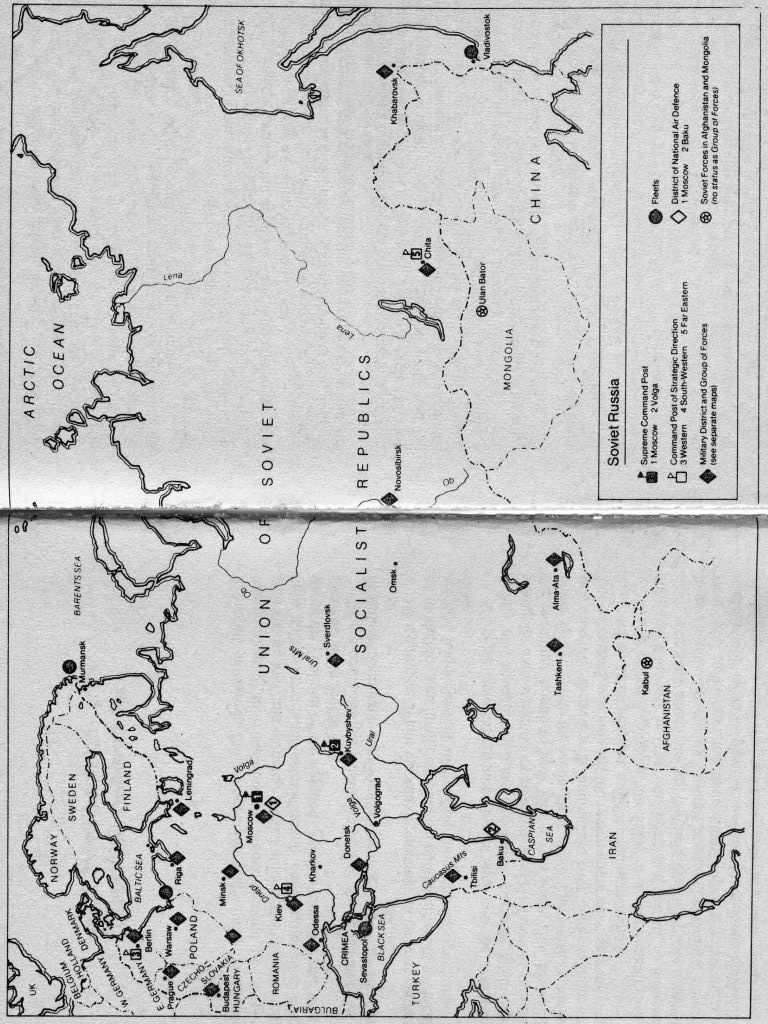
This whole affair was described, briefly, as Rear Units Exercise. But we could see what was going on with our own eyes and we realised that this was more than an exercise. It was all too serious. On too large a scale. Too unusual. Too risky. Was it likely that they would amass such enormous stocks of tank fuel and ammunition, or build thousands of underground command posts communications centres, depots and stores on the very borders of the country just for an exercise?

